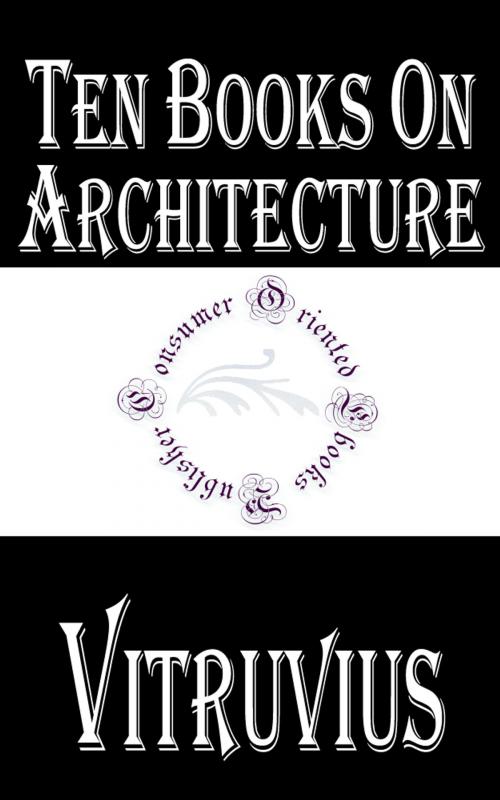Ten Books on Architecture
Nonfiction, Home & Garden, Crafts & Hobbies, Art Technique, Art & Architecture, General Art| Author: | Vitruvius | ISBN: | 1230000309293 |
| Publisher: | Consumer Oriented Ebooks Publisher | Publication: | March 5, 2015 |
| Imprint: | Language: | English |
| Author: | Vitruvius |
| ISBN: | 1230000309293 |
| Publisher: | Consumer Oriented Ebooks Publisher |
| Publication: | March 5, 2015 |
| Imprint: | |
| Language: | English |
Vitruvius was not a great literary personage, ambitious as he was to
appear in that character. As Professor Morgan has aptly said, "he has
all the marks of one unused to composition, to whom writing is a painful
task." In his hand the measuring-rod was a far mightier implement than
the pen. His turgid and pompous rhetoric displays itself in the
introductions to the different books, where his exaggerated effort to
introduce some semblance of style into his commonplace lectures on the
noble principles which should govern the conduct of the architect, or
into the prosaic lists of architects and writers on architecture, is
everywhere apparent. Even in the more technical portions of his work, a
like conscious effort may be detected, and, at the same time, a lack of
confidence in his ability to express himself in unmistakable language.
He avoids periodic sentences, uses only the simpler subjunctive
constructions, repeats the antecedent in relative clauses, and, not
infrequently, adopts a formal language closely akin to that of
specifications and contracts, the style with which he was, naturally,
most familiar. He ends each book with a brief summary, almost a formula,
somewhat like a sigh of relief, in which the reader unconsciously
shares. At times his meaning is ambiguous, not because of grammatical
faults, which are comparatively few and unimportant, but because, when
he does attempt a periodic sentence, he becomes involved, and finds it
difficult to extricate himself.
Some of these peculiarities and crudities of expression Professor Morgan
purposely imitated, because of his conviction that a translation should
not merely reproduce the substance of a book, but should also give as
clear a picture as possible of the original, of its author, and of the
working of his mind. The translation is intended, then, to be faithful
and exact, but it deliberately avoids any attempt to treat the language
of Vitruvius as though it were Ciceronian, or to give a false impression
of conspicuous literary merit in a work which is destitute of that
quality. The translator had, however, the utmost confidence in the
sincerity of Vitruvius and in the serious purpose of his treatise on
architecture.
To those who have liberally given their advice and suggestions in
response to requests from Professor Morgan, it is impossible for me to
make adequate acknowledgment. Their number is so great, and my knowledge
of the indebtedness in individual cases is so small, that each must be
content with the thought of the full and generous acknowledgment which
he would have received had Professor Morgan himself written this
preface.
Personally I am under the greatest obligations to Professor H. L.
Warren, who has freely given both assistance and criticism; to Professor
G. L. Kittredge, who has read with me most of the proof; to the Syndics
of the Harvard University Press, who have made possible the publication
of the work; and to the members of the Visiting Committee of the
Department of the Classics and the classmates of Professor Morgan, who
have generously supplied the necessary funds for the illustrations.
ALBERT A. HOWARD.
Vitruvius was not a great literary personage, ambitious as he was to
appear in that character. As Professor Morgan has aptly said, "he has
all the marks of one unused to composition, to whom writing is a painful
task." In his hand the measuring-rod was a far mightier implement than
the pen. His turgid and pompous rhetoric displays itself in the
introductions to the different books, where his exaggerated effort to
introduce some semblance of style into his commonplace lectures on the
noble principles which should govern the conduct of the architect, or
into the prosaic lists of architects and writers on architecture, is
everywhere apparent. Even in the more technical portions of his work, a
like conscious effort may be detected, and, at the same time, a lack of
confidence in his ability to express himself in unmistakable language.
He avoids periodic sentences, uses only the simpler subjunctive
constructions, repeats the antecedent in relative clauses, and, not
infrequently, adopts a formal language closely akin to that of
specifications and contracts, the style with which he was, naturally,
most familiar. He ends each book with a brief summary, almost a formula,
somewhat like a sigh of relief, in which the reader unconsciously
shares. At times his meaning is ambiguous, not because of grammatical
faults, which are comparatively few and unimportant, but because, when
he does attempt a periodic sentence, he becomes involved, and finds it
difficult to extricate himself.
Some of these peculiarities and crudities of expression Professor Morgan
purposely imitated, because of his conviction that a translation should
not merely reproduce the substance of a book, but should also give as
clear a picture as possible of the original, of its author, and of the
working of his mind. The translation is intended, then, to be faithful
and exact, but it deliberately avoids any attempt to treat the language
of Vitruvius as though it were Ciceronian, or to give a false impression
of conspicuous literary merit in a work which is destitute of that
quality. The translator had, however, the utmost confidence in the
sincerity of Vitruvius and in the serious purpose of his treatise on
architecture.
To those who have liberally given their advice and suggestions in
response to requests from Professor Morgan, it is impossible for me to
make adequate acknowledgment. Their number is so great, and my knowledge
of the indebtedness in individual cases is so small, that each must be
content with the thought of the full and generous acknowledgment which
he would have received had Professor Morgan himself written this
preface.
Personally I am under the greatest obligations to Professor H. L.
Warren, who has freely given both assistance and criticism; to Professor
G. L. Kittredge, who has read with me most of the proof; to the Syndics
of the Harvard University Press, who have made possible the publication
of the work; and to the members of the Visiting Committee of the
Department of the Classics and the classmates of Professor Morgan, who
have generously supplied the necessary funds for the illustrations.
ALBERT A. HOWARD.















